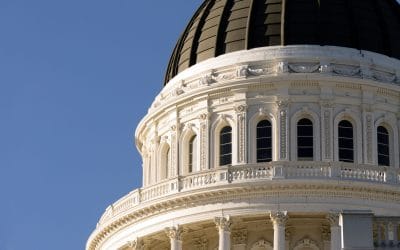Capitol Advisors Group has produced a series of comprehensive client briefs detailing new education laws that were passed by the Legislature and signed into law by Governor Brown in 2017. Each brief is organized by subject area and includes an executive summary highlighting major changes we think you should know about. Bills signed by the Governor take effect on January 1, 2018, unless the bill specifically states otherwise. A PDF version of this report is available here.
Though 2017 was a momentous year for school facilities, the bills enacted by the Legislature were, by an order of magnitude, less significant than the actions taken by state agencies following the passage of Proposition 51 (2016), the ballot measure authorizing the sale of $9 billion in state bonds for K-14 agencies. The State Allocation Board’s (SAB) $443 million apportionment of Prop. 51 funds began clearing out many of the oldest grant applications, most of which were received in 2012. Similarly, the SAB opened new funding rounds for the facilities programs that serve charter school and career technical education (CTE) programs.
On the Legislative front, we saw a handful of bills that tackled issues around the periphery of the broader question of state funding availability. AB 203, by Assembly Member Patrick O’Donnell (D–Long Beach), creates new reporting and regulatory requirements on the state agencies that oversee school funding and construction to better streamline their applications, develop regulations to increase local flexibility, and offer technical assistance for small school districts.
When it comes to public works projects, the dollar threshold for contractor registration and prevailing wage reporting was increased substantially under a deal struck in SB 96, the state budget act, authored by the Senate Committee on Budget and Fiscal Review. Similarly, SB 418, authored by Senator Ed Hernandez (D–Los Angeles), amends the “skilled and trained workforce” escalating requirements for certain professions on projects that use design-build, best-value, and lease-leaseback delivery methods (read more about SB 418 in the Changes in Law section on “School Finance”).
The Governor signed the following facility bills this year:
Energy
- AB 1145 (Quirk) – Conversion of existing overhead electric and communication facilities to underground locations: cable television corporations and cable operators
“Under-grounding” is the process of replacing overhead lines that provide services such as electricity or communications with lines underground. This bill adds cable operators (in addition to the city or a public utility) to the statutes governing utility under-grounding, which authorize the Department of Transportation and any person maintaining any utility facility to enter into a contract providing for or apportioning the obligations and costs to be borne by each party as to specified removals or relocations of utility facilities.
Chapter 792, Statutes of 2017 - AB 1414 (Friedman) – Solar energy systems: permits
This bill reduces the maximum permit fee a city or a county may charge for residential rooftop solar energy systems, applies these caps and commercial permit fee caps to a broader range of solar energy systems, and makes additional changes to existing law governing permit fees for rooftop solar energy systems and to the Solar Rights Act of 1978.
Chapter 849, Statutes of 2017
Facilities
- AB 203 (O’Donnell) – School facilities: design and construction: report: regulations
AB 203 attempts to streamline the state-level processes for approving the design and construction of school facilities. This bill requires CDE’s approval standards to also ensure that the design and construction of school facilities provide school districts with flexibility in designing instructional facilities. The bill requires CDE to develop strategies to assist small school districts with technical assistance relating to school construction and the funding of school facilities. The bill requires CDE, the Division of the State Architect (DSA), and the Office of Public School Construction (OPSC) to report to the Legislature on the feasibility of streamlining their application processes and requires CDE and OPSC to each develop regulations that provide local educational agencies with flexibility in the design of instructional facilities, as specified, for consideration by the State Board of Education and the State Allocation Board (SAB).
Chapter 837, Statutes of 2017 - AB 591 (O’Donnell) – School property: lease: county boards of education
Last year’s AB 2316 (O’Donnell) made various changes to the state’s lease-leaseback law, especially with respect to the procurement process. AB 591 will extend those changes to agreements entered into by a county board of education, county office of education, or county superintendent of schools.
Chapter 125, Statutes of 2017 - AB 746 (Gonzalez Fletcher) – Public health: potable water systems: lead testing: schoolsites
In response to concerns over lead contamination in school drinking water, AB 746 requires a community water system (CWS) that serves a schoolsite built before January 1, 2010, to test for lead in the potable water system of the schoolsite on or before July 1, 2019. Exemptions from this law include: schoolsites built or modernized after January 1, 2010; LEAs that are permitted as a public water system and are currently testing water for lead; LEAs that completed lead testing after January 1, 2009, and posted information about the lead testing on-line; and, LEAs that have requested testing from its CWS consistent with the testing prescribed by this bill.
Chapter 746, Statutes of 2017 - AB 1066 (Aguiar-Curry) – Public works: definition
Existing law defines the term “public works” for purposes of requirements regarding the payment of prevailing wages to include construction, alteration, demolition, installation, or repair work done under contract and paid for in whole or in part out of public funds, except as specified. Existing law makes a willful violation of laws relating to the payment of prevailing wages on public works a misdemeanor. This bill would expand the meaning of the term “public works” to include specific types of tree removal work. By expanding the definition of “public works,” this bill would expand the scope of a crime.
Chapter 616, Statutes of 2017 - AB 1343 (Chen) – Water conservation: school districts: Go Low Flow Water Conservation Partnerships
This bill authorizes an LEA to enter into a “Go Low Flow Water Conservation Partnership” with a public water system for purposes of reducing water use at schools, reducing stormwater and dry weather runoff at schools, reducing schoolsite water pollution, and establishing the basis for educational opportunities in water conservation. The bill would authorize a public water system to offer, as part of a partnership, a water rebate for a school that implements water-saving measures.
Chapter 90, Statutes of 2017 - SB 541 (Allen) – Water: school facility water capture practices
SB 541 requires the State Water Resources Control Board, in consultation with the regional water quality control boards, and DSA, to recommend best design and use practices for storm water and dry weather runoff capture practices that can generally be applied to all new, reconstructed, or altered public schools, including school grounds.
Chapter 811, Statutes of 2017
Transportation
- AB 28 (Frazier) – Department of Transportation: environmental review process: federal pilot program
Current law, until January 1, 2017, provided that the State of California consents to the jurisdiction of the federal courts with regard to the compliance, discharge, or enforcement of the responsibilities it assumed as a participant in the transportation project delivery pilot program carried out by the U.S. Secretary of Transportation. This bill reinstates the operation of this provision and extends its sunset date to January 1, 2020. This bill is an urgency statute and, therefore, took place immediately.
Chapter 4, Statutes of 2017 - AB 1073 (Garcia, Eduardo) – California Clean Truck, Bus, and Off-Road Vehicle and Equipment Technology Program
The California Global Warming Solutions Act of 2006 designates the State Air Resources Board (ARB) as the state agency charged with monitoring and regulating sources of emissions of greenhouse gases. The Act authorizes the ARB to include the use of market-based compliance mechanisms. This bill requires the ARB, when funding a specified class of projects, to allocate, until December 31, 2020, no less than 20% of that available funding to support the early commercial deployment of existing zero- and near-zero-emission heavy-duty truck technology.
Chapter 632, Statutes of 2017 - AB 1082 (Burke) – Transportation electrification: electric vehicle charging infrastructure: school facilities and other educational institutions
This bill authorizes electrical corporations to file with the California Public Utilities Commission (CPUC) a pilot program proposal for the installation of electric vehicle charging stations at K-12 school facilities (priority for disadvantaged communities) or other educational institutions by July 30, 2018. This bill requires the CPUC to review, modify, or decide whether to approve the program proposals filed by the electrical corporations by December 31, 2018. The bill also requires a school district, county office of education, private school or educational institution choosing to participate in the program to have the authority to establish guidelines for use of the charging stations installed pursuant to the approved program, which may include use by faculty, students, and parents, before, during, and after school hours at those times that the school facilities are operated for purposes of providing education or school- related activities. It also requires schools receiving charging stations to participate in a time-variant rate approved by the CPUC. A school district, county office of education, or private school may require users of the charging stations to pay electricity costs.
Chapter 637, Statutes of 2017 - AB 1453 (Garcia, Eduardo) – Schoolbuses: adult volunteer transportation
This bill authorizes the governing board of a school district to additionally provide for the transportation of adult volunteers to and from educational activities authorized by the school district.
Chapter 173, Statutes of 2017 - SB 1 (Beall) – Transportation funding
Passed as part of the Transportation deal of 2017, this bill creates the Road Maintenance and Rehabilitation Program to address deferred maintenance on the state highway system and the local street and road system. The bill also requires the California Transportation Commission to adopt performance criteria, consistent with a specified asset management plan, to ensure efficient use of certain funds available for the program.
Chapter 5, Statutes of 2017 - SB 20 (Hill) – Vehicles: buses: seatbelts
SB 20 requires a passenger who is 16 years of age or older in a bus that is equipped with safety belts to be properly restrained by a safety belt and would require a motor carrier to maintain those safety belts in good working order for the use of the passengers. The bill also prohibits a parent, legal guardian, or chartering party from transporting on a bus that is equipped with safety belts, or permitting to be transported on a bus that is equipped with safety belts, a child, ward, or passenger who is 8 years of age or older, but under 16 years of age, unless he or she is properly restrained by a safety belt. The bill specifically exempts school buses from these new requirements.
Chapter 593, Statutes of 2017




0 Comments